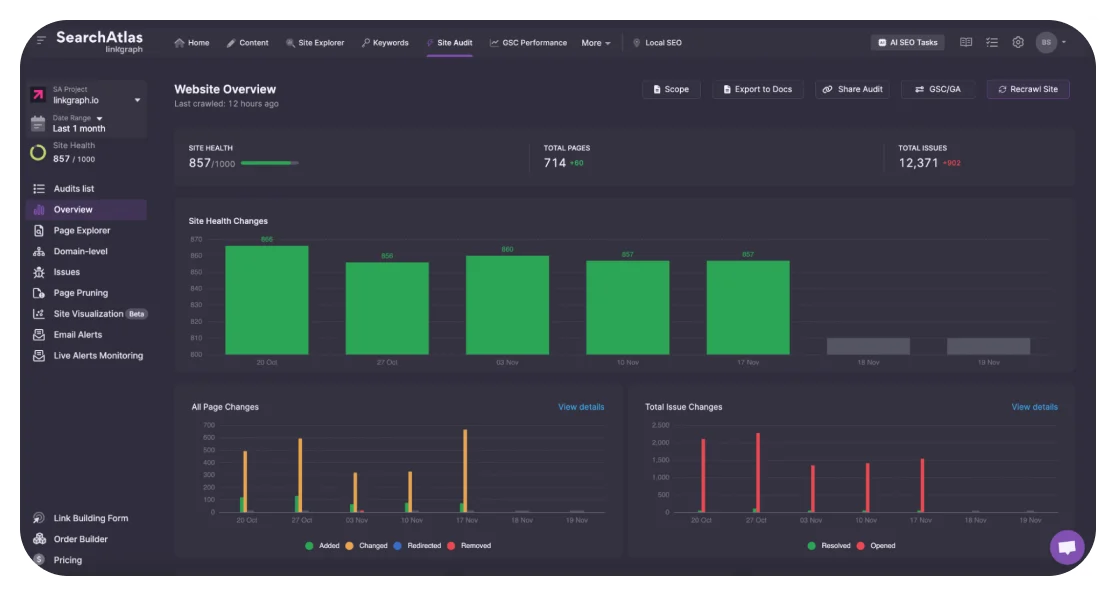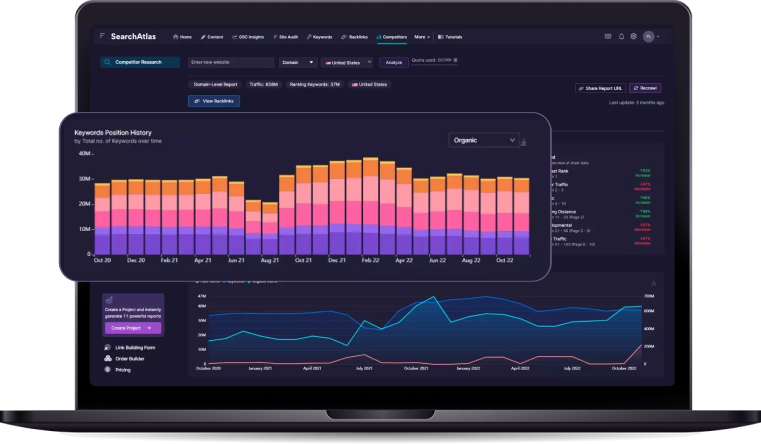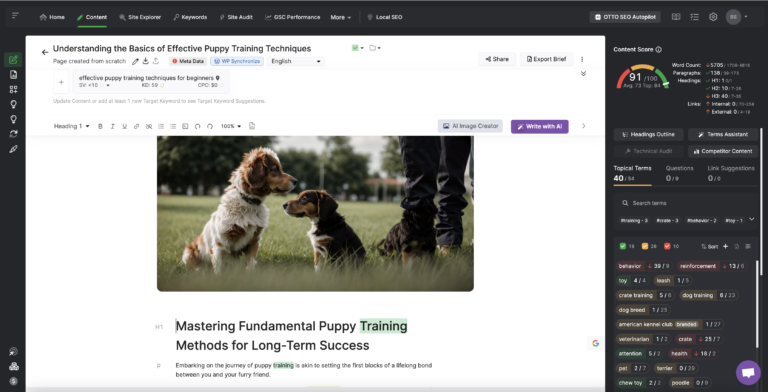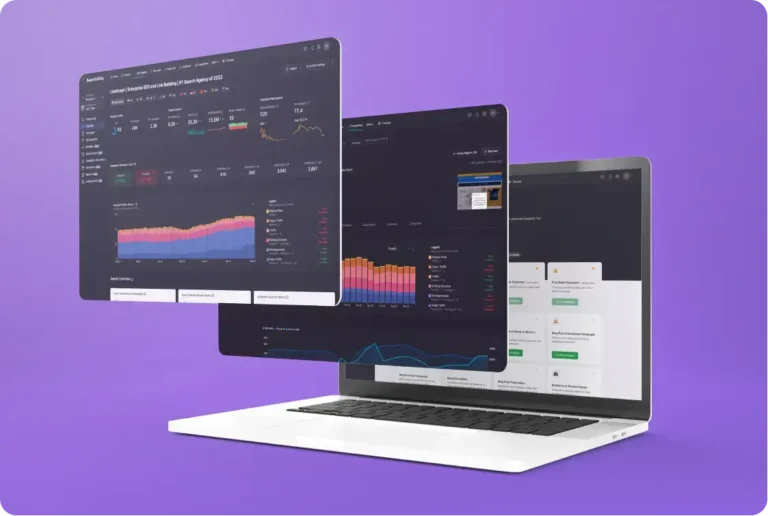Understanding the Process of Creating a Topical Map With Search Atlas
As digital marketing professionals, everyone understands the significance of SEO in positioning websites competitively in the virtual market.
But mastering the nuances of SEO is a perpetual task, and this is where Search Atlas by LinkGraph comes into play.
As a robust SEO tool, Search Atlas offers solutions for building links, enhancing topical authority, and providing comprehensive SEO services.
With features like semantic SEO, entities, and LSI keywords, users have reported substantial boosts in visibility and ranking performance.
Keep reading to explore how you can leverage the power of Search Atlas to create effective topical maps and elevate your SEO game.
Key Takeaways
- Search Atlas by LinkGraph Is a Comprehensive Toolset That Simplifies the Complex Aspects of SEO and Helps Businesses Build a Powerful Online Presence
- Creating a Topical Map Using Search Atlas Can Enhance Your Website’s Visibility and Improve Your Ranking on Search Engine Results Pages
- Search Atlas Aids in Keyword Research by Utilizing Advanced Algorithms and Tools, Such as Google BERT and Natural Language Processing, to Identify the Most Relevant Keywords for Your Brand
- Search Atlas Simplifies the Process of Creating a Topical Map by Organizing and Aligning Your Website’s Content With Its Internal Linking Structure
- Search Atlas Provides Valuable Insights and Feedback for Optimizing Your Content, Including Keyword and Link Analysis, and Evaluating the Readability of Your Text
Introduction to Search Atlas: A Comprehensive SEO Tool

For those embarking on the journey of mastering search engine optimization (SEO), Search Atlas by LinkGraph emerges as a beacon in the murky waters of online visibility. Catering to a wide variety of needs, from picking the right keywords to formulating intricate link-building strategies, this toolset takes the initial confusion out of the process.
Search Atlas, with its extensive features, empowers businesses to build a powerful online presence with a focus on topical authority and link authenticity. It dissects SEO’s multifaceted components, eases the process of creating backlinks, and devises strategies to solidify your site’s authority on a given subject matter. Most importantly, it brings these potentially overwhelming aspects of SEO into an easy-to-understand platform, enabling users to gradually master SEO’s subtleties.
Pertinent features such as Semantic SEO, site architecture, and Natural Language Processing are seamlessly integrated into Search Atlas. Alongside, valuable insights on other critical aspects of SEO, including enterprise SEO audits and filter bubble ensure that no stone is left unturned in the quest for online dominance.
In essence, Search Atlas by LinkGraph empowers businesses to step up their SEO game. By simplifying complex SEO concepts and providing actionable strategies, this tool is rapidly becoming a go-to resource for anyone looking to gain a competitive edge in the digital landscape.
Understanding the Importance of Topical Maps in SEO

A profound understanding of the importance of topical maps in SEO comes with an acceptance of its influence on your content’s relevance to search engines. Simply put, a topical map’s objective is to demonstrate how various topics are interconnected within your website, thus steering search engines towards recognizing your site’s topical authority.
The idea behind topical authority is that websites which concentrate on specific topics and deal with them comprehensively perform better in search results than those spanning multiple topics. A topical map assists in achieving this by providing search engines with a clear and detailed illustration of your website’s subject matter expertise.
Creating a topical map for SEO involves several key considerations and components:
| Component | Description |
|---|---|
| Topical Keywords | These are relevant words and phrases associated with your website’s primary topic. They must be strategically integrated into your web pages for better recognition by search engines. |
| Content Length and Quality | Information-rich, in-depth content serves to enhance your site’s topical authority. It also improves readability and user engagement. |
| Internal Linking Structure | Links connecting different parts of your website should be well-structured. This helps search engines see the connection between pages, aiding in better indexing and user navigation. |
This structured representation of your content helps search engines, like Google, to ascertain the degree of your topical expertise, thus improving your ranking on the search engine results pages (SERPs). Therefore, devising a topical map, using a tool like Search Atlas, can enhance your website’s visibility, making your SEO efforts more rewarding.
Getting Started With Search Atlas: A Step-by-Step Guide

Embarking on the journey with Search Atlas begins with a fundamental understanding of your website’s current standing, your target audience’s needs, and your business goals. The application provides you a comprehensive suite of tools designed to uncover hidden SEO potential and carves a clear pathway towards achieving quantifiable results.
One such feature offered by Search Atlas is its ability to help you choose effective keywords for SEO. By understanding the demands of your target audience and keeping up with Google BERT’s latest nuances, this feature provides insights into the most beneficial keyword strategies for your enterprise.
Next, Search Atlas aids in the crucial process of link-building and ensuring the quality of backlinks leading to your site. This in turn assists in strengthening your topical and link authority, making your web property appear more credible to search engines.
Finally, the utilization of Natural Language Processing gears up your site’s readiness for recent Google passage ranking update. Clear content structuring, readability enhancements, and the right information architecture that Search Atlas helps you create, together not only improve your site’s SERPs position but also ensure an unbeatable user experience.
Approaching Keyword Research With Search Atlas

In the world of SEO, choosing keywords is equal parts art and science, key to increasing visibility on search engine results pages (SERPs). Drawing from the vast comprehensiveness of the web, Search Atlas works in the background to navigate through the complexities of keyword selection, making the process more effortless for users.
The diligent application understands that the right keyword doesn’t merely rely on the number of searches it generates, but also how relevant the term is to your target audience. Search Atlas integrates the latest tools and algorithms, including Google BERT (Birectional Encoder Representations from Transformers) and Natural Language Processing, to discern the best keywords for your brand.
Here’s a simplified representation of how Search Atlas factors into keyword research:
| Process | Role of Search Atlas |
|---|---|
| Understanding user intent | Utilizes advanced Google BERT and NLP algorithms to comprehend the context behind search terms. |
| Identifying long-tail keywords | Leverages SEO analytics and search volume data to suggest longer, more specific keyword phrases that show high relevance and lower competition. |
| Monitoring keyword performance | Tracks targeted keywords over time, offering insights into your site’s performance and adjusting keyword strategies as needed. |
This structured approach to keyword research strengthens your SEO strategy, making your web pages more accessible to search engines and more relevant to users. Consequently, it boosts your site’s chances of showing up in relevant search results, leading to higher page ranking and better online visibility.
Building Topical Maps With Search Atlas: A Detailed Walkthrough

The innovation and ease brought forth by Search Atlas make the process of creating a topical map a less daunting task than it would typically be. The toolset utilizes a distinctive assembly of features and functions that process and organize your website’s content, generating a coherent picture of your topical focus.
One of the primary steps involves identifying key topics relevant to your website and subsequently, finding related keywords. These keywords provide insight into your website’s topical domain and offer a framework for developing a map. Search Atlas simplifies this process with its cutting-edge semantic SEO and data collection features.
Search Atlas then assists you in clustering this data and organizing it meaningfully on your web pages. It systematically aligns the topic clusters with your website’s internal linking structure, making it easier for search engines to crawl your site. This visibility leads to a stronger web page ranking in the SERPs.
Essentially, developing topical maps with Search Atlas is not merely about creating a blueprint of your website’s content. It’s about strategizing the presentation of your material in a manner that augments its relevance and authority. With the aid of Search Atlas, aligning your website with the demands of modern search algorithms becomes an achievable target.
Analyzing and Optimizing Your Content With Topical Maps From Search Atlas

Once a topical map has been created using Search Atlas, the tool proceeds to analyze and optimize your content based on this structured representation. Search Atlas examines the data, from the topical distribution of your site to the context of your content, and offers insights which can be implemented to increase both readability and relevance to search engines.
The tool goes on to provide detailed feedback on your content’s SEO performance based on various metrics. Such invaluable feedback can often reveal unexpected areas for improvement and underused opportunities, enabling users to create more effective SEO strategies and enhance their online presence.
The following table explains how Search Atlas plays a vital role in content optimization:
| SEO Component | Search Atlas Functions |
|---|---|
| Content Analysis | Examines keywords, their placement, and frequency to ensure alignment with your topical domain. |
| Link Analysis | Assesses your backlink profile to find and fix potential issues that might affect your site’s ranking. |
| Readability Analysis | Evaluates the readability of your text, making recommendations to improve user experience. |
With Search Atlas, not only can users determine content strategies but also refine them continuously, thanks to its continuous monitoring and versatile analysis capabilities. It becomes crucial to remain adaptive in the constant evolution of SEO practices, and Search Atlas provides just the right platform to do so effectively.
Frequently Asked Questions
What is searchatlas and how can it benefit my seo efforts?
Search Atlas is a powerful SEO tool that can greatly benefit your SEO efforts. Designed to help businesses analyze and improve their search engine optimization strategies, Search Atlas provides valuable insights and data to enhance website visibility and increase organic traffic.
With Search Atlas, you can conduct keyword research, track rankings, monitor backlinks, analyze competitors, and much more. By identifying the right keywords to target and optimizing your website accordingly, you can ensure that your content appears in relevant search results, attracting more qualified traffic to your site.
Furthermore, Search Atlas helps you understand the performance of your website by providing detailed reports on rankings, traffic, and engagement metrics. This allows you to identify areas for improvement and make informed decisions to enhance your SEO strategy. With its comprehensive features and user-friendly interface, Search Atlas is an indispensable tool for anyone serious about improving their search engine visibility and driving organic traffic to their website.
Why are topical maps essential for search engine optimization?
Topical maps are essential for search engine optimization (SEO) for several reasons. Firstly, topical maps help search engines understand the content and structure of a website or webpage. By organizing information into distinct topics and subtopics, search engine bots can easily navigate and index the site, making it more likely to appear in relevant search results.
Secondly, topical maps assist in keyword research and optimization. By identifying the main topics and subtopics related to a website’s content, marketers can analyze keyword data and determine which ones are relevant and have high search volume.
This information can then be used to optimize on-page elements, such as meta tags, headings, and content, making it easier for search engines to understand the site’s relevance to specific searches. Furthermore, topical maps aid in creating a user-friendly experience. By organizing content in a logical and hierarchical structure, website visitors can easily navigate through different topics and find the information they need.
This improves user engagement and reduces bounce rates, both of which are important factors in determining search engine rankings. Moreover, topical maps also facilitate the creation of topic clusters or pillar content. This SEO strategy involves creating comprehensive and authoritative content around a main topic or keyword. By interlinking various blog posts, articles, and pages that revolve around the same topic, search engines can recognize the expertise and relevance of the website in that particular area, boosting its SEO rankings.
Lastly, topical maps help websites stay up-to-date with the latest trends and changes in the industry. By regularly updating and expanding the content within each topic, websites can demonstrate their commitment to providing valuable and current information, which search engines favor. In conclusion, topical maps play a crucial role in SEO by organizing website content, aiding in keyword optimization, enhancing user experience, facilitating the creation of topic clusters, and keeping websites current. By utilizing topical maps, websites can improve their visibility, search rankings, and ultimately attract more organic traffic.
What are the step-by-step instructions for using searchatlas?
Using Search Atlas is a straightforward process that can help you uncover valuable insights and data for your online business. Here are the step-by-step instructions to guide you through using this powerful tool.
1. Access the Search Atlas website: Start by visiting the official Search Atlas website. You can easily find it by searching for “Search Atlas” on any search engine. Once you’re on the website, familiarize yourself with the layout and features.
2. Define your search parameters: Before diving into the data, it’s essential to have a clear understanding of what you’re looking for. Whether it’s identifying your target audience demographics, understanding keyword trends, or exploring market competition, outline your goals and objectives.
3. Select the appropriate tools: Search Atlas offers a variety of tools to cater to different research needs. Depending on your goals, choose the suitable tool from the available options. These can include keyword research, competitor analysis, demographic insights, and more.
4. Enter your search queries: Once you’ve selected the relevant tool, it’s time to input your keywords or specific queries. This allows Search Atlas to generate accurate and insightful data to support your research objectives.
5. Analyze the results: As you submit your search queries, Search Atlas will process the data and present you with a range of valuable insights. These can include search volume, keyword difficulty, competitiveness, demographic information, and other relevant metrics.
6. Refine and expand your search: Explore the data presented by Search Atlas and use it to guide your decision-making process. Identify trends, opportunities, and potential areas for improvement. If necessary, refine your search query to get more specific results or expand it to gain a broader understanding.
7. Export and save reports: Search Atlas enables you to export the data and insights you’ve gathered for future reference or to share with team members. This feature allows you to keep a record of your research and access it whenever needed.
8. Repeat and iterate: Utilize the information you’ve obtained from Search Atlas to optimize your online presence, keyword strategy, content creation, or targeting methods. Regularly repeat the research process to stay up-to-date with evolving trends and remain ahead of the competition. By following these step-by-step instructions, you can make the most of Search Atlas and leverage its powerful capabilities to boost your online business presence, target the right audience, and optimize your marketing efforts.
How can searchatlas help with keyword research?
Keyword research is a crucial aspect of any successful SEO strategy. It helps businesses understand what terms and phrases their target audience is searching for, enabling them to optimize their website and content accordingly.
However, conducting keyword research can be a time-consuming and daunting task, especially for those who are new to SEO. That’s where Search Atlas comes in to help. Search Atlas is a comprehensive keyword research tool that provides valuable insights into search volume, competition, and trends.
It offers a user-friendly interface that allows users to conduct in-depth keyword research effortlessly. With Search Atlas, you can uncover the most relevant and high-performing keywords for your business niche, which can significantly improve your website’s visibility in search engine rankings. One of the key features of Search Atlas is its ability to provide accurate and up-to-date data on search volume.
By understanding how often specific keywords are searched, businesses can align their content creation efforts to target the most popular and frequently searched terms. This not only drives more organic traffic to their website but also increases the chances of attracting qualified leads.
Furthermore, Search Atlas also provides valuable insights into keyword competitiveness. It evaluates the level of competition for specific keywords, allowing businesses to gauge their chances of ranking highly in search engine results. This information enables them to choose keywords that have a good balance between search volume and competition, thus increasing their chances of success.
Another benefit of using Search Atlas is its trend analysis feature. It enables users to identify emerging trends and capitalize on them before their competitors. By keeping an eye on the latest search trends, businesses can stay ahead of the curve and adjust their strategies accordingly. This proactive approach to keyword research can give them a competitive advantage and drive more targeted traffic to their website.
Overall, Search Atlas is a powerful tool that simplifies the keyword research process. It helps businesses find the most relevant and high-performing keywords, provides insights into search volume and competitiveness, and allows for trend analysis. By using Search Atlas, businesses can optimize their SEO efforts and improve their online visibility, ultimately driving more organic traffic and attracting qualified leads.
What are the key steps involved in building a topical map with searchatlas?
Building a topical map with Search Atlas involves several key steps that ensure an effective and well-structured map. Here are the steps:
1. Define Your Topic: Start by clearly defining the topic or subject you want to create a topical map for. This could be anything from a broad industry to a specific niche topic.
2. Gather Relevant Keywords: Conduct thorough keyword research to identify the most relevant and popular terms related to your topic. These keywords will form the foundation of your topical map.
3. Categorize Your Keywords: Group the keywords into relevant categories or subtopics. This helps in organizing the information and creating a logical flow within your map.
4. Create a Hierarchy: Establish a hierarchical structure within each category to provide a clear progression of information. This can be done by dividing the keywords into primary and secondary terms, representing different levels of subtopics.
5. Prioritize Key Concepts: Identify the key concepts or ideas that are central to your topic. These should be the main focus of your topical map and will serve as the main branches.
6. Expand on Each Branch: For each key concept, expand further by adding related keywords and subtopics as branches. This helps to provide a comprehensive coverage of your chosen subject.
7. Map Relationships: Connect the branches and subtopics by establishing relationships between them. You can do this by drawing lines or using arrows to indicate the connections and associations.
8. Refine and Optimize: Review your topical map and make any necessary refinements to improve its clarity and structure. Ensure that the keywords and branches are relevant, and the relationships accurately represent the connections between topics.
9. Publish and Share: Once you’re satisfied with your topical map, publish it on Search Atlas or any other platform of your choice. Share it with your intended audience, whether it’s your teammates, clients, or readers, to help them understand and navigate the topic effectively. By following these key steps, you can create a well-organized and informative topical map using Search Atlas. This will not only improve your own understanding of the subject but also aid others in comprehending complex topics easily.
Conclusion
Understanding the process of creating a topical map with Search Atlas is a crucial step in bolstering any website’s SEO strategy.
It allows businesses to demonstrate their subject matter expertise to search engines, aiding in better visibility and higher page rankings.
With its industry-leading SEO analysis tools, Search Atlas empowers users to effectively strategize and optimize their online content.
Whether it’s keyword selection, readability enhancement, or backlink profile improvement, Search Atlas thereby hones a path towards substantial online growth.
Quite profoundly, understanding and deploying the mapping process with Search Atlas becomes a cornerstone for driving your website’s digital success.









